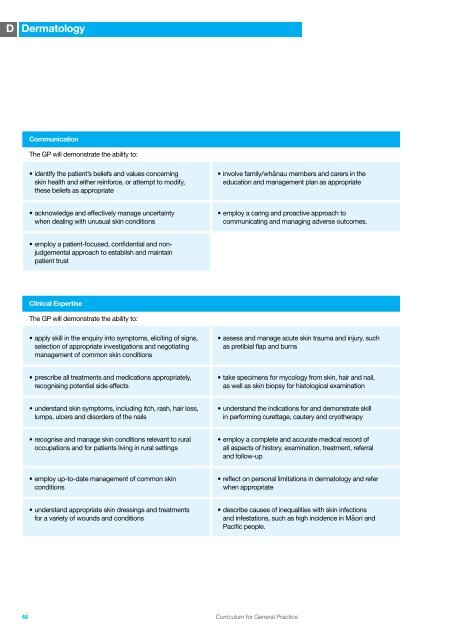Curriculum for General Practice - The Royal New Zealand College ...
Curriculum for General Practice - The Royal New Zealand College ...
Curriculum for General Practice - The Royal New Zealand College ...
Create successful ePaper yourself
Turn your PDF publications into a flip-book with our unique Google optimized e-Paper software.
D Dermatology<br />
Communication<br />
<strong>The</strong> GP will demonstrate the ability to:<br />
• identify the patient’s beliefs and values concerning<br />
skin health and either rein<strong>for</strong>ce, or attempt to modify,<br />
these beliefs as appropriate<br />
• involve family/whānau members and carers in the<br />
education and management plan as appropriate<br />
• acknowledge and effectively manage uncertainty<br />
when dealing with unusual skin conditions<br />
• employ a caring and proactive approach to<br />
communicating and managing adverse outcomes.<br />
• employ a patient-focused, confidential and nonjudgemental<br />
approach to establish and maintain<br />
patient trust<br />
Clinical Expertise<br />
<strong>The</strong> GP will demonstrate the ability to:<br />
• apply skill in the enquiry into symptoms, eliciting of signs,<br />
selection of appropriate investigations and negotiating<br />
management of common skin conditions<br />
• assess and manage acute skin trauma and injury, such<br />
as pretibial flap and burns<br />
• prescribe all treatments and medications appropriately,<br />
recognising potential side effects<br />
• take specimens <strong>for</strong> mycology from skin, hair and nail,<br />
as well as skin biopsy <strong>for</strong> histological examination<br />
• understand skin symptoms, including itch, rash, hair loss,<br />
lumps, ulcers and disorders of the nails<br />
• understand the indications <strong>for</strong> and demonstrate skill<br />
in per<strong>for</strong>ming curettage, cautery and cryotherapy<br />
• recognise and manage skin conditions relevant to rural<br />
occupations and <strong>for</strong> patients living in rural settings<br />
• employ a complete and accurate medical record of<br />
all aspects of history, examination, treatment, referral<br />
and follow-up<br />
• employ up-to-date management of common skin<br />
conditions<br />
• reflect on personal limitations in dermatology and refer<br />
when appropriate<br />
• understand appropriate skin dressings and treatments<br />
<strong>for</strong> a variety of wounds and conditions<br />
• describe causes of inequalities with skin infections<br />
and infestations, such as high incidence in Māori and<br />
Pacific people.<br />
48<br />
<strong>Curriculum</strong> <strong>for</strong> <strong>General</strong> <strong>Practice</strong>

















